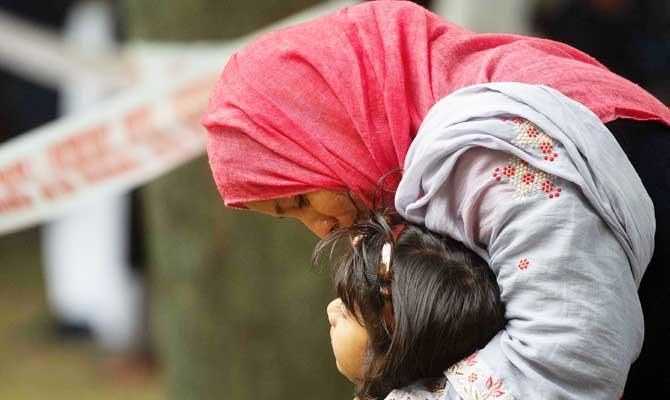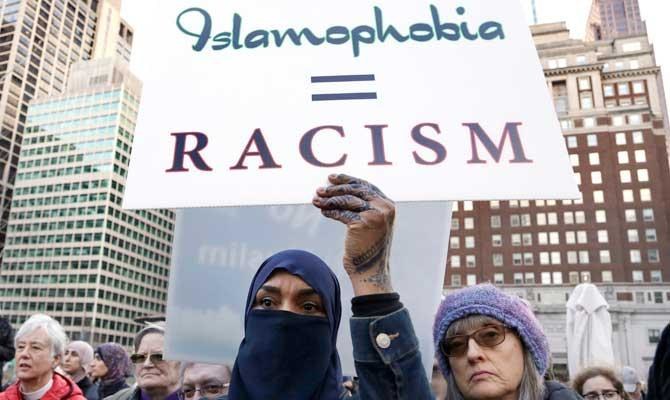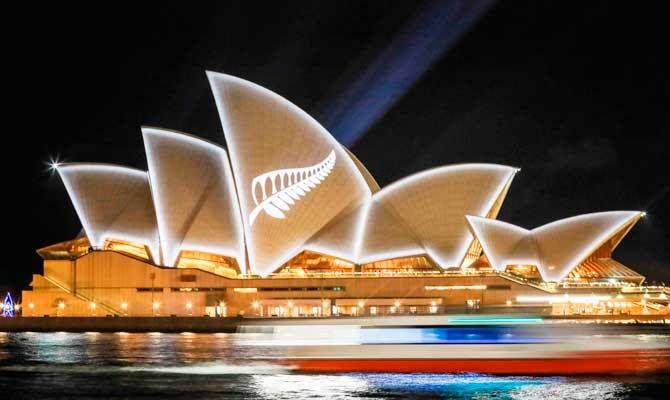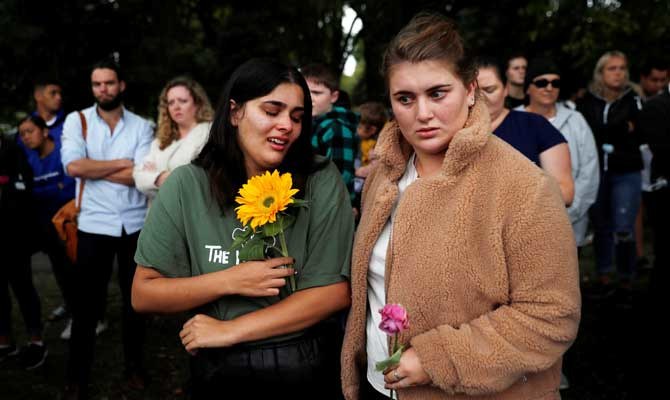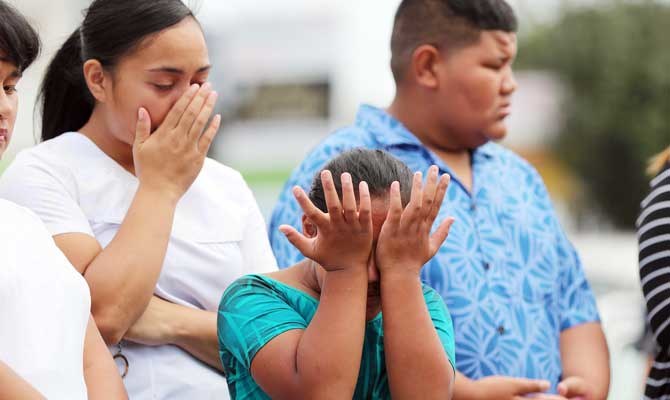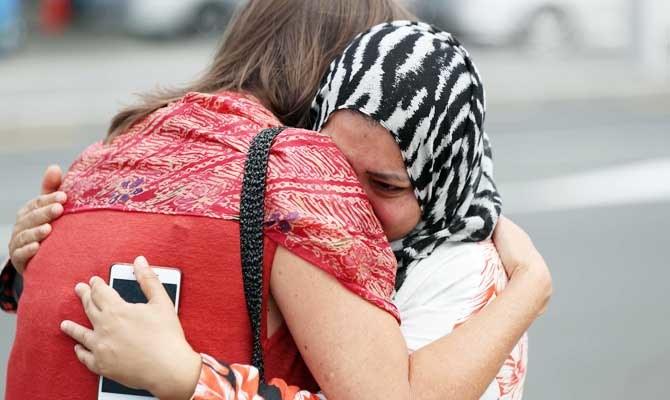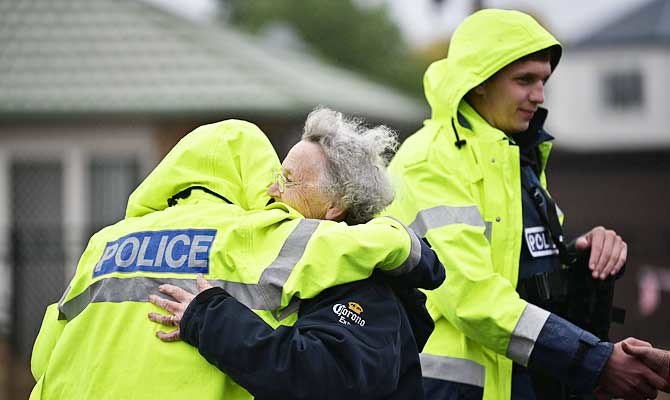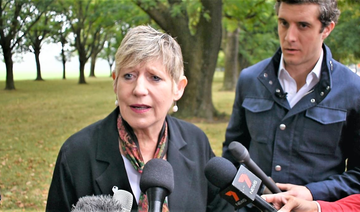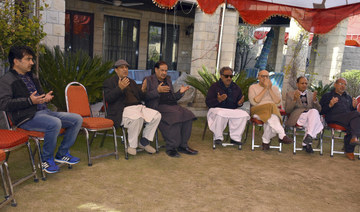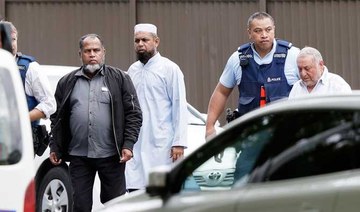CHRISTCHURCH: An attack on a New Zealand mosque took the lives of 50 worshippers Friday and left dozens more wounded when a white supremacist opened fire and live-streamed the shootings. Here are the stories of some of those killed and wounded.
THE DEAD
HUSNA AHMED
Farid Ahmed refuses to turn his back on his adopted home, despite losing his 45-year-old wife, Husna Ahmed, in the Al Noor mosque attack. They had split up to go to the bathroom when it happened.
The gunman livestreamed the massacre on the Internet, and Ahmed later saw a video of his wife being shot. A police officer confirmed she died.
Despite the horror, Ahmed — originally from Bangladesh — still considers New Zealand a great country.
“I believe that some people, purposely, they are trying to break down the harmony we have in New Zealand with the diversity,” he said. “But they are not going to win. They are not going to win. We will be harmonious.”
___
SYED AREEB AHMED, 26
Ahmed had recently moved from his house in Karachi, Pakistan, for a job in New Zealand to help support his family back home. On Saturday, Pakistan’s foreign ministry informed his family that Ahmed was among those killed during the mosque attack.
One of his uncles, Muhammad Muzaffar Khan, described him as deeply religious, praying five times a day. But education was always his first priority, Khan said.
Ahmed was an only son who had immigrated to New Zealand for work, his uncle said.
“Education had always remained his first priority,” Khan said. “He had gone to New Zealand recently where he got his job. He had only started his career, but the enemies took his life“
Family members, relatives, and friends have gathered at Ahmed’s house to express their condolences. His body is expected to arrive there in the coming days.
___
FARHAJ AHSAN, 30
The software engineer moved to New Zealand six years ago from the city of Hyderabad in India, where his parents still live, according to the Mumbai Mirror.
“We received the disturbing news,” Ahsan’s father, Mohammed Sayeeduddin told the newspaper Saturday. Friends and family had been trying to reach Ahsan since the attack.
Ahsan was married and had a 3-year-old daughter and infant son.
___
ABDULLAHI DIRIE, 4
Four of Adan Ibrahin Dirie’s five children managed to escape Friday’s attacks, but the youngest, Abdullahi, was killed, his uncle, Abdulrahman Hashi, 60, a preacher at Dar Al Hijrah Mosque in Minneapolis, told the New Zealand Herald.
Dirie also suffered gunshot wounds and was hospitalized. The family fled Somalia in the mid-1990s as refugees and resettled in New Zealand.
“You cannot imagine how I feel,” Hashi said.
He added: “He was the youngest in the family. This is a problem of extremism. Some people think the Muslims in their country are part of that, but these are innocent people.”
___
ALI ELMADANI
Elmadani and his wife immigrated from the United Arab Emirates in 1998. The retired Christchurch engineer always told his children to be strong and patient, so that’s what they are trying to do after the tragedy, his daughter, Maha Elmadani, told Stuff.
“He considered New Zealand home and never thought something like this would happen here,” she said.
She said her mother “is staying as strong as possible. My younger brother isn’t doing too well with the news.”
___
ATTA ELYAN
Atta Elyan, who was in his 30s, died of his wounds from the shooting, Muath Elyan, his uncle, told The Associated Press.
His father, Mohammed Elyan, a Jordanian in his 60s who co-founded one of the mosques in 1993, was among those wounded, said Muath Elyan, Mohammed’s brother, who said he spoke to Mohammed’s wife after the shooting.
Muath said his brother helped establish the mosque a year after arriving in New Zealand, where he teaches engineering at a university and runs a consultancy. He said his brother last visited Jordan two years ago.
“He used to tell us life was good in New Zealand and its people are good and welcoming. He enjoyed freedom there and never complained about anything,” Muath told the AP. “I’m sure this bloody crime doesn’t represent the New Zealanders.”
___
LILIK ABDUL HAMID
The longtime aircraft maintenance engineer at Air New Zealand was killed in the Al Noor mosque when he was killed, his employer said in a statement.
“Lilik has been a valued part of our engineering team in Christchurch for 16 years, but he first got to know the team even earlier when he worked with our aircraft engineers in a previous role overseas,” Air New Zealand Chief Executive Officer Christopher Luxon said. “The friendships he made at that time led him to apply for a role in Air New Zealand and make the move to Christchurch. His loss will be deeply felt by the team.
Hamid was married and had two children, Luxon said.
“Lilik, his wife Nina and their children Zhania and Gerin are well known and loved by our close-knit team of engineers and their families, who are now doing all they can to support the family alongside our leadership team and the airline’s special assistance team,” he said.
___
MUCAAD IBRAHIM, 3
At just 3 years old, Mucaad Ibrahim is the youngest known victim of the attacks. He was separated from his older brother Abdi and their father when the shooting began at the Al Noor mosque.
After an agonizing search by the family, Abdi said police finally confirmed that the toddler had been killed.
Mucaad was born and raised in Christchurch. He was beloved by the community, known for his energetic demeanor and easy laugh. He was bright and bubbly, and loved playing with an iPad.
Ahmed Osman, a close family friend, said Mucaad used to cheer from the sidelines as Osman and Abdi played soccer on Friday evenings at a park near the mosque. The little boy had planned to watch them play soccer as usual on Friday. He never made it.
Osman said the support of the community has helped the family pull through.
“New Zealand is always behind us,” he said. “Even when we walk down the street, people stop us and say, ‘Are you guys OK?’ That’s what New Zealand is about. It’s all about coming together. One person cannot stop us.”
___
This story corrects the spelling of Mucaad Ibrahim’s first name.
___
MOHAMMAD IMRAN KHAN
A handwritten cardboard sign outside Mohammad Imran Khan’s restaurant, the Indian Grill in Christchurch, on Sunday said simply CLOSED. A handful of pink flowers laid nearby.
The owner of the convenience store next door, JB’s Discounter, Jaiman Patel, 31, said he helped the staff with the keys after the terrorist attack that claimed Khan’s life.
“He’s a really good guy. I tried to help him out with the setup and everything,” Patel said. “We also put the key out for them when the terrorists come, and sorted it out for him.”
Khan had a son who was 10 or 11, Patel said.
The two were business neighbors who helped each other out when needed, he said.
“We are helping each other. It’s so sad.”
___
SAYYAD MILNE, 14
Milne was described as a good-natured, kind teenager. The high school student was at the Al Noor mosque for Friday prayers when the attack started, his half-sister, Brydie Henry, told the Stuff media outlet.
Sayyad was last seen “lying on the floor of the bloody mosque, bleeding from his lower body,” she said her father told her.
Sayyad’s mother, Noraini, was also in the mosque and managed to escape, Henry said. The teenager has two other siblings, 15-year-old twins Shuayb and Cahaya.
“They’re all at home just waiting. They’re just waiting and they don’t know what to do,” Henry told the news site.
___
JUNAID MORTARA, 35
Javed Dadabhai is mourning for his gentle cousin, 35-year-old Junaid Mortara, believed to have died in the first mosque attack.
His cousin was the breadwinner of the family, supporting his mother, his wife and their three children, ages 1 to 5. Mortara had inherited his father’s convenience store, which was covered in flowers on Saturday.
Mortara was an avid cricket fan, and would always send a sparring text with relatives over cricket matches when Canterbury faced Auckland.
___
HAJI DAOUD NABI, 71
Nabi moved his family to New Zealand in 1979 to escape the Soviet-Afghan war. Days before the shootings, his son, Omar, recalled his father speaking about the importance of unity.
“My father said how important it is to spread love and unity among each other and protect every member of the society we live in,” Omar told Al-Jazeera.
Omar told the news network his father ran an Afghan Association and helped refugees settle in to a new country.
“He used to make them feel at home,” Omar said.
___
HUSNE ARA PARVIN, 42
Parvin died being struck by bullets while trying to shield her wheelchair-bound husband, Farid Uddin Ahmed, her nephew Mahfuz Chowdhury told The Daily Star , a Bangladesh newspaper.
Chowdhury said Uddin had been ill for years and Parvin took him to the mosque every other Friday. She had taken him to the mosque for men while she went to the one for women. Mahfuz said relatives in New Zealand told him when the shootings began, Parvin rushed to her husband’s mosque to protect him. He survived.
The Bangladeshi couple had moved to New Zealand sometime after 1994, Chowdhury said.
___
NAEEM RASHID, 50, and TALHA RASHID, 21
As the shootings unfolded, Naeem Rashid is seen on video trying to tackle the gunman, according to Rashid’s brother, Khurshid Alam.
“He was a brave person, and I’ve heard from a few people there, there were few witnesses . they’ve said he saved a few lives there by trying to stop that guy,” Alam told the BBC .
Rashid’s son, Talha Rashid, is also among the dead. Pakistan’s Ministry of Public Affairs confirmed their deaths in a tweet .
The elder Rashid was a teacher in Christchurch and was from Abbottabad, Pakistan. His son was 11 when his family moved to New Zealand. He had a new job and planned to get married.
___
HUSSEIN AL-UMARI
An Iraqi who born in Abu Dhabi was killed in the attack on two mosques in New Zealand.
His mother wrote on social media that Hussein Al-Umari was killed.
His family and friends had been seeking information on Al-Umari, in his mid-30s, who had failed to return after going to Friday prayers at the Al Noor mosque in Christchurch.
His mother, an Iraqi calligraphy artist named Janna Ezzat, wrote on Facebook that her son had become a martyr.
Ezzat wrote: “Our son was full of life and always put the needs of others in front of his own.”
___
INDIAN CITIZENS KILLED
India’s ambassador to New Zealand issued the following names of Indian citizens who were killed in the mosque attacks:
— Maheboob Khokhar
— Ramiz Vora
— Asif Vora
— Ansi Alibava
— Ozair Kadir
Indian news reports said Alibava, 25, had moved to New Zealand last year after marrying Abdul Nazar.
The Indian Express newspaper said she was studying agriculture technology at Lincoln University and her husband worked at a supermarket in Christchurch. They got married in 2017.
The Manorama Online news site said her mother, Rasia, had prayed for the safety of the two when the news broke of the attacks.
Alibava used to call her family back in India every day, but they were worried when there was no call after the shootings. They later found out from the husband what had happened.
The report said she was hoping to find a job in New Zealand to support her family back home.
___
MORE PAKISTANI VICTIMS IDENTIFIED
Pakistan’s foreign ministry confirmed nine Pakistanis were killed in the Christchurch mosque attacks. They have been identified as follow:
Zeeshan Raza, his father Ghulam Hussain and mother Karam Bibi, Sohail Shahid, Syed Jahandad Ali, Syed Areeb Ahmed, Mahboob Haroon, Naeem Rashid and his son Talha Naeem.
Naeem Rashid and his son Talha Naeem, 22, died after trying to disarm the shooter.
Rashid’s brother Dr. Mohammad Khursheed, who lives in Pakistan’s garrison city of Abbottabad, received an emotional call from his sister-in-law telling him of his brother’s death. He died along with his son Talha Naeem .
Khursheed said his brother had already bought his plane ticket to Pakistan for a May family reunion. “He was very brave. He snatched the gun and I think he saved many lives,” Khursheed said.
Rashid had migrated to New Zealand in 2009. He was teacher here and same profession he had adopted there and so his wife.
Rashid’s 75-year-old mother Bedar Bibi was devastated and wanted to fly to New Zealand for a last look at her son and grandson. “I want the New Zealand government should take me there so I can have one last look of my beloved son and my grandson Talha,” she said.
The foreign ministry provided more information about other citizens who died in the attacks:
— Sohail Shahid, son of Muhammad Shabbir, age 40.
— Syed Jahanand Ali, age 34.
— Mahboob Haroon, son of Shahid Mehboob, resident of Rawalpindi, age 40.
___
THE WOUNDED
ELIN DARAGHMEH
A Palestinian woman says her 4-year-old daughter is fighting for her life while her husband is in serious but stable condition after being wounded in the mosque shooting.
Asmaa Daraghmeh, 27, said the family moved to New Zealand from Jordan four years ago when her husband received a permit to work as a hair dresser.
“It was a great opportunity,” she said, crying on the phone. “The country is safe, beautiful and hospitable.”
She spoke from the Auckland hospital where their daughter, Elin, remained in intensive care. Her husband, 33, was being transported to the same hospital.
Asmaa said she is a devout Muslim who was active in the mosque.
“Our life was great in this great country until this devil appeared and turned it to hell,” she said.
___
SHIHADEH NASASRAH
Shihadeh Nasasrah, 63, who was wounded in the New Zealand mosque shooting, said he spent terrifying minutes lying underneath two dying men as the gunman kept firing.
The assailant “would go out and bring more ammunition and resume shooting,” said Nasasrah, speaking by phone from a Christchurch hospital where he was recovering from two shots to the leg. “Every time he stopped, I thought he was gone. But he returned over and over again. I was afraid to leave because I didn’t know the safest way out. I died several times, not one time.”
Nasasrah had attended Friday prayers at the Al Noor Mosque with his friend, Abdel Fattah Qasim, 60, who was killed in the shooting. Both were originally from the West Bank — Nasasrah from the town of Beit Furik and Qasim from the town of Arabeh.
Nasasrah said about 200 to 300 worshippers were in the mosque for Friday prayers, and that he and his friend were sitting in the front, near the imam, or prayer leader. The imam was delivering the sermon when the gunman burst into the mosque, he said.
“Panic spread all over the place,” Nasasrah said. “Some started saying Allahu Akbar (God is great). We scrambled to leave toward a second door that leads to a hall and then to the street, but the bullets brought us down.”
“Two people came on top of me, and he (the gunman) approached us and opened fire. Both were killed and I felt them dying,” Nasasrah said. “I felt their blood. I myself was shoot and I thought ‘I’m dying’.”
He said he uttered the words that devout Muslims speak before their death — “there is no God but Allah, and Mohammed is his messenger.”
Nasasrah, a car dealer, said most of the worshippers were from Asia, including Indonesia, India, Singapore and Malaysia, and that Arabs made up a smaller part of the congregation.
The attack left him and other Muslims in the area worried and puzzled.
“I never heard a racist word in this country,” he said. “I don’t know what happened and why. I will not leave this country. Our lives are well established here, our homes, works, family is here and we will not leave.”
As a young man, Nasasrah studied English in the Syrian capital of Damascus, and then worked as a translator at the New Zealand embassy in Saudi Arabia for 14 years. The father of three moved to New Zealand in 1990. His three children graduated from universities in New Zealand and have established their lives in the country.
___
MUHAMMAD AMIN NASIR, 67
Nasir and his son were just 200 meters (219 yards) from the Al Noor mosque on Friday when everything went wrong. They had no idea that a white supremacist had just slaughtered at least 41 people inside the mosque. A car that had been driving by suddenly stopped, and a man leaned out the window pointing a gun at them.
They ran as the bullets began to fly. But at 67, Nasir could not keep up with his 35-year-old son. He fell behind by two or three fateful steps.
The gunman drove away. A pool of blood poured from Nasir’s body.
Nasir, who lived in Pakistan, had been regularly visiting his son in New Zealand.
He was on the third week of his visit when he was shot. He remains in an induced coma with critical injuries, though his condition has stabilized.
___
ADEEB SAMI, 52
As the rampage inside the mosque began, Sami was shot in the back as he dove to protect his two sons, Abdullah, 29, and Ali, 23, the Gulf News reported.
“My dad is a real hero. He got shot in the back near his spine in an attempt to shield my brothers but he didn’t let anything happen to them,” Adeeb’s daughter, Heba, 30, told the Gulf News.
Sami, described by the Gulf News as a Dubai-based New Zealander of Iraqi origin, underwent surgery to remove the bullet and his daughter said he’s recovering.


Stories of the victims of the New Zealand mosque attack
Stories of the victims of the New Zealand mosque attack

- The document provides the names of 44 men and four women, and so is missing the identities of two of the 50 victims confirmed as dead by police
- Another 34 victims remained at Christchurch Hospital, where officials said 12 were in critical condition
Philippine volcano eruption sends ash 2.5 kilometers into sky

- Kanlaon Volcano, one of 24 active volcanoes in the archipelago nation, has had several major eruptions in the past century
- A 1996 blast killed three hikers who were near the summit at the time
MANILA: A volcano erupted in the central Philippines on Thursday evening, sending a billowing plume of ash about 2,500 meters (1.5 miles) into the nighttime sky.
The two-minute eruption began at 7:04 p.m. (1104 GMT), state volcanology agency director Teresito Bacolcol said, saying “there might be a bigger explosive eruption in the next few days.”
Kanlaon Volcano, one of 24 active volcanoes in the archipelago nation, has had several major eruptions in the past century — including a 1996 blast that killed three hikers who were near the summit at the time.
“This is the second moderate eruption in a week,” Bacolcol said in a phone interview, adding his agency would monitor the volcano for 24 hours before deciding if it should raise the alert level from two to three on its five-point scale.
“This event generated a plume that rose 2,500 meters above the crater before drifting southwest. Incandescent ballistics were observed to have rained around the crater,” the volcanology center said in a statement released minutes later.
John De Asis, a rescuer in the nearby town of La Castellana, said that ash had begun to descend on local neighborhoods.
“Tonight, we heard a sudden, loud boom, then after a few minutes, people started reporting that there was ashfall in their areas,” he said, noting that rescue personnel were handing out facemasks.
Bacolcol said it was possible that “gas pressure had built up at the vent” of the volcano. He said recent low sulfur dioxide emissions suggested a potential blockage that would have caused pressure to build.
The volcano, which straddles Negros Oriental and Occidental provinces, currently has a four-kilometer exclusion zone in place.
The Philippines is on the seismically active region of the Pacific known as the “Ring of Fire,” where more than half the world’s volcanoes are located.
The most powerful volcanic explosion in the Philippines in recent years was the 1991 eruption of Pinatubo, about 100 kilometers (62 miles) from Manila, which killed more than 800 people.
The two-minute eruption began at 7:04 p.m. (1104 GMT), state volcanology agency director Teresito Bacolcol said, saying “there might be a bigger explosive eruption in the next few days.”
Kanlaon Volcano, one of 24 active volcanoes in the archipelago nation, has had several major eruptions in the past century — including a 1996 blast that killed three hikers who were near the summit at the time.
“This is the second moderate eruption in a week,” Bacolcol said in a phone interview, adding his agency would monitor the volcano for 24 hours before deciding if it should raise the alert level from two to three on its five-point scale.
“This event generated a plume that rose 2,500 meters above the crater before drifting southwest. Incandescent ballistics were observed to have rained around the crater,” the volcanology center said in a statement released minutes later.
John De Asis, a rescuer in the nearby town of La Castellana, said that ash had begun to descend on local neighborhoods.
“Tonight, we heard a sudden, loud boom, then after a few minutes, people started reporting that there was ashfall in their areas,” he said, noting that rescue personnel were handing out facemasks.
Bacolcol said it was possible that “gas pressure had built up at the vent” of the volcano. He said recent low sulfur dioxide emissions suggested a potential blockage that would have caused pressure to build.
The volcano, which straddles Negros Oriental and Occidental provinces, currently has a four-kilometer exclusion zone in place.
The Philippines is on the seismically active region of the Pacific known as the “Ring of Fire,” where more than half the world’s volcanoes are located.
The most powerful volcanic explosion in the Philippines in recent years was the 1991 eruption of Pinatubo, about 100 kilometers (62 miles) from Manila, which killed more than 800 people.
© 2026 SAUDI RESEARCH & PUBLISHING COMPANY, All Rights Reserved And subject to Terms of Use Agreement.


